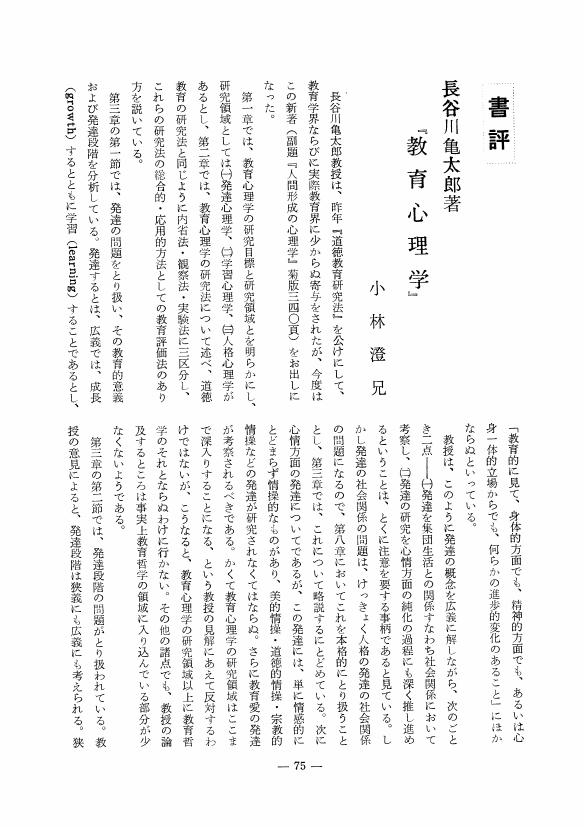1 0 0 0 OA 研究討議に関する総括的報告
- 著者
- 毛利 陽太郎 林 忠幸
- 出版者
- 教育哲学会
- 雑誌
- 教育哲学研究 (ISSN:03873153)
- 巻号頁・発行日
- vol.1999, no.79, pp.18-21, 1999-05-10 (Released:2009-09-04)
- 著者
- 小林 万里子
- 出版者
- 教育哲学会
- 雑誌
- 教育哲学研究 (ISSN:03873153)
- 巻号頁・発行日
- vol.1999, no.79, pp.59-74, 1999-05-10 (Released:2009-09-04)
- 参考文献数
- 41
Am Ende des 19. Jahrhunderts, als in Hamburg ein staatliches Volksschulwesen eingerichtet wurde, hatten die Volksschullehrer über ihre Arbeit, also Erziehung und Schulverwaltung wenige Rechte zu sagen. Sie kritisierten die Verbürokratisierung der Schule. Um ihre Rechte von der Offentlichkeit anerkannt zu sehen, starteten sie nicht nur eine reformpädagogische Bewegung (Kunsterziehungsbewegung oder Arbeitsschulbewegung), sondern auch eine soziale Bewegung, oder nahmen daran teil. In der Bewegung entwarfen sie die 'neue Schule' als Alternative zur 'alten Schule'. Um diesen Entwurf zu realisieren, verlangten sie öffentlich eingerichtete Versuchsschulen.In der Versuchsschule Berliner Tor, die 1919 entstand, wurde eine Erziehung eingeführt, die auf dem Interesse und der Förderung des Kindes basiert, wobei diese von seiten der Lehrer angefaßt wurden. Die Lehrer der Berliner Tor Schule forderten nicht nur das Recht des Kindes, sondern auch immer dasjenige der Lehrer selbst.Daher stellte sich heraus, daß die Pädagogik 'vom Kinde aus' in der Hamburger Schulreformbewegung aufgrund der Forderung der Lehrer selbst nach Selbständigkeit entworfen wurde.
1 0 0 0 OA 教育哲学を間う-教育学における古典研究の意味- 旧新約聖書から学ぶ
- 著者
- 小林 政吉
- 出版者
- 教育哲学会
- 雑誌
- 教育哲学研究 (ISSN:03873153)
- 巻号頁・発行日
- vol.1994, no.69, pp.22-28, 1994-05-10 (Released:2010-01-22)
- 参考文献数
- 10
1 0 0 0 OA シュライエルマッハーの「社交性理論」に関する一考察 教育学的基礎づけとしての社交性理論
- 著者
- 林 昌鎬
- 出版者
- 教育哲学会
- 雑誌
- 教育哲学研究 (ISSN:03873153)
- 巻号頁・発行日
- vol.1992, no.66, pp.29-42, 1992-11-10 (Released:2009-09-04)
- 参考文献数
- 44
Schleiermacher is counted among the theorists of dialectic pedagogy and regarded today in German pedagogy together with Herbart as an original founder of scientific pedagogy in the 19th century. This paper examines his work “An Attempt at a Theory of Free Sociability” in which for the first time his ideas of formation appear. The concept of 'sociability' (Freie Geselligkeit) described in that treatise functions as a very important idea in his educational theory, but, unfortunately, in Schleiermacher research in Japan, it has been scarcely introduced so far.In this article, first I present the situation of sociability in Schleiermacher's contemporary society which may be considered the historical and social background of his 'theory of sociability', then, after discussing the influence of the Herenhuters, I try to analyze his 'theory of sociability, as a foundation of his educational theory.
1 0 0 0 OA 教育哲学を考える
- 著者
- 小林 政吉
- 出版者
- 教育哲学会
- 雑誌
- 教育哲学研究 (ISSN:03873153)
- 巻号頁・発行日
- vol.1990, no.62, pp.47-48, 1990-11-10 (Released:2009-09-04)
- 著者
- 林 泰成
- 出版者
- 教育哲学会
- 雑誌
- 教育哲学研究 (ISSN:03873153)
- 巻号頁・発行日
- vol.1988, no.58, pp.56-69, 1988-11-10 (Released:2009-09-04)
- 参考文献数
- 56
The purpose of this article is to consider the method which is used by R. S. Peters to justify education and to explain it in the light of Wittgenstein's philosophy.First of all, Peters' concept of education and its relation to the concept of value will be made clear. He divided values into extrinsic and intrinsic ones and regards the latter as more important because the explication of extrinsic values cannot arrive at an ultimate justification. Secondley, the 'transcendental argument' is examined because Peters regarded it as a method for clarifying intrinsic values. The 'transcendental argument' comes from Kantian terminology, and “attempts to make explicit what a person is committed to who makes use of his reason in attempting the question 'what ought I to do ? ”'.But it seems that Peters' argumentation is a petitio principii, for he presupposes that 'curriculum activities' include intrinsic values preceding his argumentation. In other words, what a person is committed to who makes use of his reason is assumed to be 'curriculum activities'. According to Wittgenstein, all kinds of justification are included within the limits of a 'language game', and issue in a 'from of life'. From such a point of view, the significance of Peters attempt may lie in the fact that the presumptions of his argumentation indicate that 'language game' and the 'form of life' coincide with curriculum activities'.
1 0 0 0 OA 研究討議に関する総括的報告
- 著者
- 小林 政吉 境沢 和男
- 出版者
- 教育哲学会
- 雑誌
- 教育哲学研究 (ISSN:03873153)
- 巻号頁・発行日
- vol.1984, no.49, pp.21-22, 1984-05-10 (Released:2009-09-04)
1 0 0 0 OA 「読み」の人間学的意味 アランの哲学の根底にあるもの
- 著者
- 小林 恭
- 出版者
- 教育哲学会
- 雑誌
- 教育哲学研究 (ISSN:03873153)
- 巻号頁・発行日
- vol.1981, no.43, pp.63-80, 1981-05-10 (Released:2009-09-04)
- 参考文献数
- 92
It is felt that something is lacking in the traditional approach toward the problem of 'dialogue'. The reason is that a difference between 'parole' and 'écriture' is being tacitly presupposed. Alain, in his educational theory, has re-emphasized education through 'lecture' (reading) and is critical concerning instruction by means of dialogue. It would, however, be a mistake to interpret this as simply ascribing value to 'écriture'. To the contrary, his ideas are very illuminating in view of building up the power of true dialogue. His educational theory rests on the foundation of a creative and well thought-out philosophy of 'signe'. He thinks that all 'signes' consist of 'langage absolu' and 'langage relatif'. Whenever relative language is dominant, and the absolute language which lies at its basis to support human thinking, is forgotten, thinking turns out to be mechanical and man is alienated from his true self. Alain thinks that the goal of education is that everybody recovers his own true self and realizes his spiritual freedom, but he maintains that in order to accomplish this, it is necessary that the absolute language be restored and the exercise of 'lecture' is necessary. The attempt is here made to clarify the reasons for this by referring to his philosophy which elucidated the hermeneutic structure of thought.
1 0 0 0 OA マールブルク大学教育学科 教育学講座・学科の形成をめぐって
- 著者
- 林 忠幸
- 出版者
- 教育哲学会
- 雑誌
- 教育哲学研究 (ISSN:03873153)
- 巻号頁・発行日
- vol.1980, no.42, pp.67-72, 1980-11-25 (Released:2009-09-04)
1 0 0 0 OA 研究討議に関する総括的報告
- 著者
- 小林 博英
- 出版者
- 教育哲学会
- 雑誌
- 教育哲学研究 (ISSN:03873153)
- 巻号頁・発行日
- vol.1978, no.37, pp.27-31, 1978-05-10 (Released:2009-09-04)
1 0 0 0 OA 西ドイツにおける教育哲学の最近の動向 教育学的人間学の試み
- 著者
- 小林 博英
- 出版者
- 教育哲学会
- 雑誌
- 教育哲学研究 (ISSN:03873153)
- 巻号頁・発行日
- vol.1967, no.16, pp.81-86, 1967-10-10 (Released:2009-09-04)
- 参考文献数
- 13
1 0 0 0 OA 『教育心理学』
- 著者
- 小林 澄兄
- 出版者
- 教育哲学会
- 雑誌
- 教育哲学研究 (ISSN:03873153)
- 巻号頁・発行日
- vol.1965, no.12, pp.75-80, 1965 (Released:2009-09-04)
1 0 0 0 OA 『道徳教育研究法』
- 著者
- 小林 澄兄
- 出版者
- 教育哲学会
- 雑誌
- 教育哲学研究 (ISSN:03873153)
- 巻号頁・発行日
- vol.1964, no.10, pp.68-69, 1964 (Released:2009-09-04)
この本は、早稲田大学教授長谷川亀太郎氏の新著であって、道徳教育の意味・内容の研究法を明らかにすることを期したものである。
1 0 0 0 倫理/道徳/啓蒙 : 1984-88
- 著者
- ミシェル・フーコー [著] 小林康夫 石田英敬 松浦寿輝編集 [慎改康之ほか訳]
- 出版者
- 筑摩書房
- 巻号頁・発行日
- 2002
1 0 0 0 文学/言語/エピステモロジー : 1964-1967
- 著者
- [ミシェル・フーコー著] [小林康夫ほか訳]
- 出版者
- 筑摩書房
- 巻号頁・発行日
- 1999
1 0 0 0 OA がん闘病記の社会学 患者の声を聴く
- 著者
- 門林 通子
- 出版者
- 日本医学哲学・倫理学会
- 雑誌
- 医学哲学 医学倫理 (ISSN:02896427)
- 巻号頁・発行日
- vol.34, pp.59, 2016 (Released:2018-05-07)
- 著者
- 小林 英司
- 出版者
- 日本医学哲学・倫理学会
- 雑誌
- 医学哲学 医学倫理 (ISSN:02896427)
- 巻号頁・発行日
- vol.20, pp.212-215, 2002-11-10 (Released:2018-02-01)
1 0 0 0 OA 遺伝子治療における「遺伝子」の意味と倫理的問題
- 著者
- 大林 雅之
- 出版者
- 日本医学哲学・倫理学会
- 雑誌
- 医学哲学 医学倫理 (ISSN:02896427)
- 巻号頁・発行日
- vol.10, pp.71-79, 1992-10-23 (Released:2018-02-01)
The study of genes, with the development of molecular biology, raises ethical issues in the basic and applied life sciences, including biotechnology and biomedical sciences. The ethical issues are connected with recombinant DNA experiments, the Human Genome Project, experiments on organisms with recombinant DNA in the field, gene diagnosis, gene therapy, etc. In this papar, I am particularly concerned with the structure of ethical problems in gene therapy and I consider it in terms of the biological meanings of genes. Ethical problems in the study of genes at the molecular level have occurred today because we can manipulate genes directly. However, when we know the biological meanings of genes, it is not easy for us to manipulate genes from the ethical point of view. The gene has three meanings: (1) It is the product of evolution, (2) It is what creates the identity of each human being, (3) It is the source of the continuity of the human species. Therefore, gene manipulation is connected with individual problems, the relations among generations, the problems between human beings and the ecosystem, and the whole world of organisms. When we consider the ethical problems in human gene therapy in terms of the three meanings of genes, we can see new problems concernings gene therapy as follows: Can we avoid the problems which appear among generations even if we can practice gene therapy not with somatic cells but with germline cells, given meanings (1) and (3) ? Moreover, will gene therapy exacerbate problems connected with the evaluation of genetic information for each person in terms of eugenics, given meaning (2) ?
- 著者
- 大林 雅之
- 出版者
- 日本医学哲学・倫理学会
- 雑誌
- 医学哲学 医学倫理 (ISSN:02896427)
- 巻号頁・発行日
- vol.8, pp.65-78, 1990-07-31 (Released:2018-02-01)
From the late 1960s, arguments concerning ethical problems in clinical applications and experiments of life sciences and biomedical sciences began in the United States. They caused the birth of a new discipline, bioethics. This situation influenced American medical education and showed various difficulties in the traditional ways of training physicians in professional ethics. American medical schools had to make new educational programs, that is, medical humanities, whereby students would have special courses in human values. The purpose of this paper is to consider historically the connection between the bioethics movement and the development of humanistic medical education in the United States and to make clear the influence of bioethical ideas in medical humanities. The author concludes that the medical humanities program is based on the ideas of bioethics. One of these is that a patient's autonomy has to be respected in medicine. Another is that we must participate in interdisciplinary discussions in order to make correct decisions in ethical problems of life sciences and medicine. The necessity of humanistic medical education in Japanese medical schools is also discussed.
1 0 0 0 OA シュレーディンガーの生命観 : 『生命とは何か』をめぐって
- 著者
- 大林 雅之
- 出版者
- 日本医学哲学・倫理学会
- 雑誌
- 医学哲学 医学倫理 (ISSN:02896427)
- 巻号頁・発行日
- vol.6, pp.41-51, 1988-07-31 (Released:2018-02-01)












